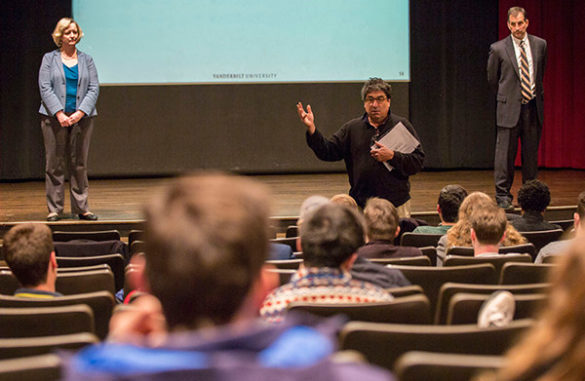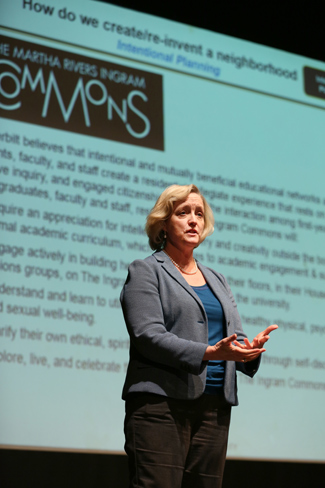
About 75 students shared their ideas on the possibilities for the redevelopment of Vanderbilt University’s West End neighborhood at a Chancellor’s Town Hall March 15.
The meeting, hosted by Chancellor Nicholas S. Zeppos as part of the FutureVU campus land-use initiative, focused on upcoming changes to the part of campus that houses Carmichael Towers, Greek Row and West Side Row. It was the first of several focus groups to be held this spring. Vice Chancellor for Academic Affairs and Provost Susan R. Wente and Vice Chancellor for Administration Eric Kopstain helped lead the discussion.
“Every 10 to 15 years, we step back and think about our facilities and the land we occupy. How we approach our land is reflective of our philosophy,” Zeppos said. “[rquote]We are a community where equality, inclusion, friendship and community are important to us. How we use our land is a direct response to those beliefs.”[/rquote]
He invited students to share their constructive feedback on the projects. “Student involvement is critical to the success of these projects,” he added.
The discussion touched on the FutureVU initiative and examples of intentional land use planning that have made a positive impact—The Martha Rivers Ingram Commons, the Engineering and Science Building and the Wond’ry, and the new Center for Student Wellbeing —and a negative impact—the 25th Avenue parking garage—before moving into a discussion about new residential colleges. The proposed site for the next residential colleges is on West End Avenue between 23rd and 25th avenues, where the Carmichael Towers and the Tarpley Building currently stand.

“The FutureVU initiative allows us to be intentional about how the campus grows and changes to enhance the university’s mission and reflect the goals of the Academic Strategic Plan,” Wente said. “The Ingram Commons is a wonderful example of intentional planning—we wanted our first-year students to arrive at Vanderbilt and be part of a focused residential learning community. The planning for three proposed residential colleges provides us with a great opportunity to collaborate to beautify and enhance the overall West End neighborhood and make it inclusive, accessible and welcoming.”
The plan calls for the Residential College at Tarpley construction to begin in 2018 and open in 2021, followed by the Residential Colleges at Towers project. These communities that extend the student learning experience beyond the classroom will join The Ingram Commons, Warren and Moore College and Vanderbilt Barnard residential colleges as well as living-learning communities at the McGill Project, McTyeire International House and the Mayfield Lodges.
Kopstain showed examples from other campuses of spaces that are pedestrian-friendly while still allowing vehicle access when needed. “We can think about how to reconfigure the roadways to make them friendlier to pedestrians and bicyclists but still multifunctional,” he said. “We also want to consider how we incorporate green spaces and make that corner more welcoming to people who come to Vanderbilt.”
Kopstain also talked about parking issues. He pointed out that currently one-third of Vanderbilt’s square footage is parking, and one-fourth of the campus land is devoted to parking. “That’s not sustainable,” he said. “We are looking at ways to address that.”
Student questions included the future of Greek Row. Zeppos said there are no current plans to move any Greek houses out of the neighborhood. Instead, he said, the goal is to beautify the area and potentially add more buildings so that it becomes a place for everyone on campus.
The three administrators stressed the importance of student involvement in the planning. They expect to hold seven student focus groups this spring and welcome further student participation in the overall project.
To learn more about the project or get involved in the land-use initiative, visit the FutureVU website.